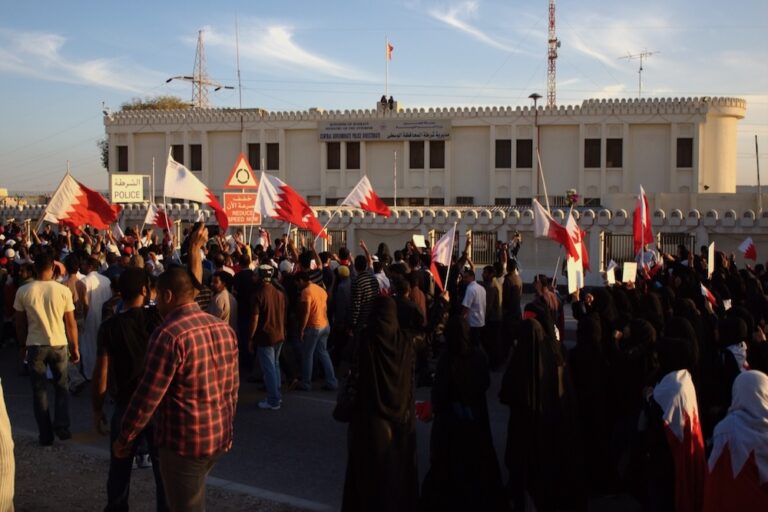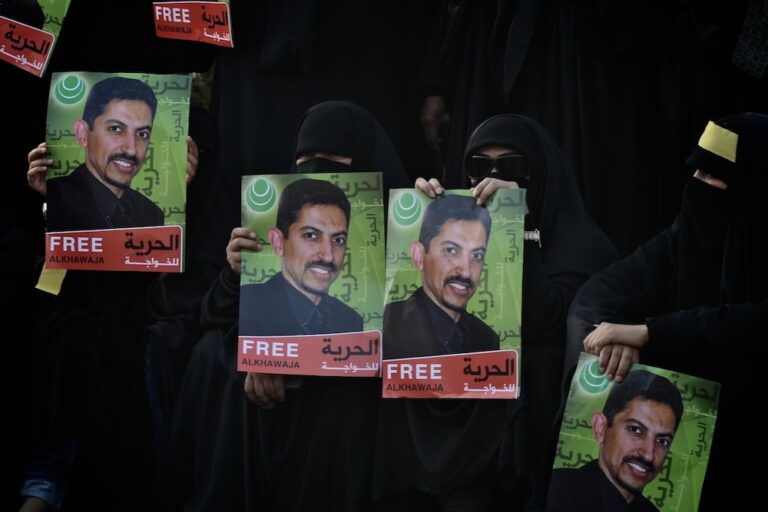UN member states expressed strong concerns over the country's human rights record during the second cycle of their Universal Periodic Review in Geneva.
(BCHR/IFEX) – London/Geneva, 25 May 2012 – UN member states expressed strong concerns over Bahrain’s human rights record during the second cycle of their Universal Periodic Review (UPR) in Geneva on Tuesday. States issued a total of 176 recommendations, a marked improvement from the 9 recommendations issued by states when Bahrain was the first state chosen for review in the first cycle in 2008. This indicates that states are taking the UPR process more seriously and know they cannot let Bahrain’s human rights abuses pass without censure.
Many member states expressed strong concerns regarding the lack of progress made towards realizing the recommendations made by the Bahrain Independent Commission of Inquiry (BICI). These recommendations were submitted to the King in November 2011 in a report which confirmed that the regime committed serious human rights violations during their efforts to suppress pro-democracy protests since February 2011. The regime in Bahrain insists that the recommendations in the report have been accepted, but that their implementation will take time; many member states expressed the opinion that this progress is too slow or all together lacking.
The International Service for Human Rights (ISHR) called the opening statement by Bahrain’s delegation ‘bemusing’, saying that Bahrain’s Human Rights minister “spoke vaguely yet optimistically of Bahrain’s ‘culture of respect’ for human rights” while avoiding specific mention of last year’s protests beyond references to ‘unfortunate events’. The conflicting narratives of the Bahrain regime and international human rights bodies was in evidence throughout the session and in the way it was reported, with an article by the state-owned Gulf Daily News titled ‘Bahrain Defends Rights Success’.
Four years of failure
Bahrain began by thanking the Office of the High Commissioner for Human Rights, for its technical and financial support for the implementation of the last UPR recommendations, for which it was given $1.4 million and which resulted in the creation of a Government controlled human rights group and a few training sessions. The majority of the previous recommendations were never implemented.
Bahrain did not mention the fact of its failure to implement the 2008 recommendations but stated that it had begun a national human rights education plan to ‘encourage a human rights culture’. Looking at the 2008 recommendations, it can be seen that this was not one of the suggestions at the time. The delegation then attempted to pretend that the creation of the Supreme Council for Women in Bahrain was a way of furthering the role of women in society, when in fact it is used by the regime to give political jobs to female members of the royal family. The women’s rights activist Ghada Jamsheer was banned from appearing on national media in 2007 when she dared to criticize the Supreme Council for Women for not taking any steps towards implementing a family law on citizenship, a recommendation from 2008 which still has not been achieved. The Council for Women is said to be studying the recommendation to remove reservations from the Convention on Elimination of Discrimination Against Women (CEDAW), which was another recommendation from 2008 that is not yet implemented.
Bahrain has not confirmed any visits from UN Special Rapporteurs. The Government has earlier postponed the visit of the Special Rapporteur on Torture days before it was planned to take place. So far no new date for the visit has been set.


